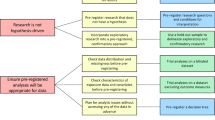Abstract
The Polish equivalents of Research Ethics Committees are Bioethics Committees (BCs). A questionnaire study has been undertaken to determine their situation. The BC is usually comprised of 13 members. Nine of these are doctors and four are non-doctors. In 2006 BCs assessed an average of 27.3 ± 31.7 (range: 0–131) projects of clinical trials and 71.1 ± 139.8 (range: 0–638) projects of other types of medical research. During one BC meeting an average of 10.3 ± 14.7 (range: 0–71) projects of medical research were assessed (2006). The amendment of Polish laws according with Directive 2001/20/EC caused a percentage increase in BCs which assessed less than 20 projects per year (16% vs. 33% or 42% in 2003 vs. 2005 or 2006 respectively, p < 0,05). The results confirm the usefulness of the current practice of creating BCs by medical universities, medical institutes and regional chambers of physicians and dentists but rationalization of the workload for individual BCs is necessary.

Similar content being viewed by others
Notes
The Rector of the Medical University of Gdansk, Prof. Z. Brzozowski’s letter to Prof. S. Raszeja appointing him as the Head of the Team for Deontological Assessment of Scientific Research on the day of 15.01.1979r. R.013-1/78/79––the author retains a copy.
References
Gibiński, K. (2003). Bioethics committee in view of one’s own scientific environment. In Ethics in medical sciences (pp. 71–83). Katowice: Medical University of Silesia––Main Library.
Act of 5 December 1996 on professions of physician and dentist. (2005). Journal of Laws, 226, pos. 1943 (unified version).
Ordinance of the Minister of Health and Social Security of 11 May 1999 addresses matters of establishing, financing and mode of action of Bioethics Committees. (1999). Journal of Laws, 47, pos. 480.
The Constitution of the Republic of Poland. (1997). Journal of Laws, 79, pos. 483.
Bioethics Appeals Commission. http://www.kb.mz.gov.pl/index_en.html.
Czarkowski, M. (2006). Standard operating procedures in ethics committees. Polski Merkuriusz Lekarski, 116, 249–253.
Resolution Nr 4/07/V of the Supreme Medical Council of 16 February concerning Center of Bioethics of the Supreme Medical Council. (2007). Bulletin of the Supreme Medical Council, 2, 1–2.
Directive 2001/20/EC of the European Parliament and of the Council of 4 April 2001 on the approximation of the laws, regulations and administrative provisions of the member states relating to the implementation of good clinical practice in the conduct of clinical trials on medicinal products for human use. (2001). Official Journal of the European Communities, 121, 34–44.
Governance arrangements for NHS Research Ethics Committees. (2001). http://www.dh.gov.uk/en/Publicationsandstatistics/Publications/PublicationsPolicyAndGuidance/DH_4005727.
Guidelines and Recommendations for European Ethics Committees. (1997). European Forum for Good Clinical Practice.
Canadian Institutes of Health Research, Natural Sciences and Engineering Research Council of Canada, Social Sciences and Humanities Research Council of Canada. (1998). Tri-Council Policy Statement. Ottawa: Ethical Conduct for Research Involving Humans. (with 2000, 2003, 2005 amendments).
The International Conference on Harmonization of Technical Requirements for Registration of Pharmaceuticals for Human Use. (1996). ICH Harmonized Tripartite Guideline for Good Clinical Practice ICH-GCP. http://www.ich.org/cache/compo/276-254-1.html.
Foster, C. G., Marshall, T., & Moodie, P. (1995). The annual reports of Local Research Ethics Committees. Journal of Medical Ethics, 21, 214–219. doi:10.1136/jme.21.4.214.
Dal-Ré, R., Ortega, R., & Morejón, E. (2005). Multicentre trials review process by research ethics committees in Spain: Where do they stand before implementing the new European regulation? Journal of Medical Ethics, 31, 35–344. doi:10.1136/jme.2003.007492.
World Medical Association. (2008). Declaration of Helsinki. Ethical principles for medical research involving human subjects. Available at http://www.wma.net/e/policy/b3.htm.
Operational Guidelines for Ethics Committees that Review Biomedical Research. (2000). Geneva: World Health Organization.
The International Ethical Guidelines for Biomedical Research involving human subjects. (2002). Geneva: Council for International Organizations of Medical Sciences.
Nicholson, S. (2006). The role of an Attorney. In E. A. Bankert, R. J. Amdur (Eds.), Institutional Review Board. Management and function (pp. 73–77).
Act of 6 September 2001––Pharmaceutical law. (2004). Journal of Laws, 53, pos. 533 (unified version).
Amdur, R. J., & Bankert, E. A. (2006). Committee size, alternates and consultants. In E. A. Bankert & R. J. Amdur (Eds.), Institutional Review Board. Management and function (pp. 78–80). Sudburry: Jones and Barlett Publishers.
Amdur, R. J. (2006). Institutional Review Board Subcommittees. In E. A. Bankert & R. J. Amdur (Eds.), Institutional Review Board. Management and function (pp. 83–86). Sudburry: Jones and Barlett Publishers.
Decullier, E., Lhéritier, V., & Chapuis, F. (2005). The activity of French Research Ethics Committees and characteristics of biomedical research protocols involving humans: A retrospective cohort study. BMC Medical Ethics, 6, 9. Published online 2005 October 17. doi:10.1186/1472-6939-6-9. doi:10.1186/1472-6939-6-9.
Boyce, M. (2002). Observational study of 353 applications to London multicentre research ethics committee 1997–2000. BMJ (Clinical Research Ed.), 325, 1081. doi:10.1136/bmj.325.7372.1081.
Arshad, A., & Arkwright, P. D. (2008). Status of healthcare studies submitted to UK research ethics committees for approval in 2004–5. Journal of Medical Ethics, 34, 393–395. doi:10.1136/jme.2007.020545.
Stern, J. M., & Simes, R. J. (1997). Publication bias: Evidence of delayed publication in a cohort study of clinical research projects. BMJ (Clinical Research Ed.), 315, 640–645.
Guide No 2 Bioethics committees at work: Procedures and policies. (2006). Paris: United Nations Educational, Scientific and Cultural Organization.
Acknowledgements
The Authors would like to thank Ms Jolanta Wysocka for her help in preparing and sending out the questionnaire forms to the BCs. This research was conducted thanks to funding from the Center of Bioethics of the Supreme Medical Council and the Department of Endocrinology and Internal Medicine of the Medical University of Warsaw.
Conflict of Interest
M. Czarkowski is the Chairman of the BC of the Warsaw Chamber of Physicians and Dentists.
Author information
Authors and Affiliations
Corresponding author
Rights and permissions
About this article
Cite this article
Czarkowski, M., Różanowski, K. Polish Research Ethics Committees in the European Union System of Assessing Medical Experiments. Sci Eng Ethics 15, 201–212 (2009). https://doi.org/10.1007/s11948-009-9113-x
Received:
Accepted:
Published:
Issue Date:
DOI: https://doi.org/10.1007/s11948-009-9113-x




